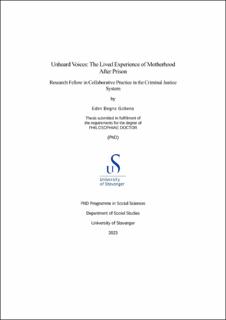| dc.description.abstract | Incarcerated mothers, often the primary caregivers for their children, face a unique set of challenges. Their incarceration not only affects the immediate family structure but also poses significant challenges upon reintegration into society. Many of these mothers grapple with long-standing issues like poverty, abuse, and mental health and substance abuse problems, all of which can impede their successful reintegration. Prior research has delved into their apprehension of re-entry, including fears of discrimination and lack of adequate support systems. However, a significant gap exists in understanding their lived experiences, particularly in resuming their role as mothers post-incarceration.
For professionals in the field of social work, truly understanding and addressing the needs of these mothers requires a close knowledge of their stories and lived experiences. This study seeks to bridge this gap by centring the experiences of motherhood post-incarceration, shedding light on challenges and successes in a culturally sensitive context. By doing so, this research not only contributes to the broader literature on women’s re-entry but also underscores the importance of viewing incarcerated mothers beyond the lens of their criminal past, highlighting our shared humanity.
The study’s objectives were threefold:
• Understand motherhood post-prison in a global context and identify knowledge gaps.
• Delve into the lived experiences of post-incarceration motherhood in Ethiopia, a context often overlooked in mainstream research.
• Assess the trustworthiness of the empirical study in Ethiopia, focusing on issues related to data collection. Reflections focused on how researchers elicit and engage with the stories of formerly incarcerated women (a marginalised group) to understand their experience of motherhood after prison in culturally diverse contexts such as Ethiopia, where the cultural and religious context is different from the Global North.
Utilising both secondary and primary data, this research provides a comprehensive overview of the topic. From the secondary data, 14 articles were analysed and synthesised, offering insights into mothers’ experiences post-incarceration globally. The primary study, set in Ethiopia, employed a descriptive phenomenological approach, gathering data from nine released mothers through in-depth interviews. Finally, reflective practices were also incorporated, with the researcher’s fieldwork diary offering valuable insights.
The study underscores that formerly incarcerated mothers deeply value their maternal identity. They often make personal sacrifices to shield and nurture their children, mirroring the protective characters of most mothers universally. This finding highlights the shared human experience and the necessity to view these mothers beyond the lens of their criminal histories.
However, a major revelation from the study was the perception of these mothers post-release. The shadow of incarceration often cast them in the role of “bad mothers,” subjecting them to societal stigma. This external judgement not only tarnished their societal role but also deeply affected their self-worth. Their keen desire to care for and reconnect with their children post-release was followed by guilt over their children’s hardships during their absence. Their journey to reclaim their maternal role post-release was accompanied by challenges. Factors such as strained mother-child relationships, discrimination, unemployment, housing issues, poverty, mental health concerns, and substance abuse further complicated their reintegration. As a result, while these mothers may physically return to society, they often find themselves alienated from their children, families, and the broader societal frameworks, leading to feelings of neglect.
It is crucial to approach the experiences of formerly incarcerated mothers from a holistic, intersectional viewpoint. They navigate an intricately linked marginalisation necessitating structural adjustments. Historically, these mothers have faced marginalisation due to poverty, trauma, and abuse. Their incarceration and subsequent release amplify these challenges, with issues like childcare, rebuilding parent-child bonds, unemployment, and lack of supportive networks coming to the forefront.
The study also points out the nuanced complexities of intersectionality, especially concerning women in regions like Ethiopia. These women, besides being formerly incarcerated, also belong to the Global South, a region often researched through a predominantly Western lens. Attempts to understand the perspectives of these mothers in the Global South can sometimes be flawed by cultural insensitivity. This double-edged shortcoming – of not listening to their experiences and failing to gather data in a culturally attuned manner – further deepens their marginalisation. While some steps have been taken in social work education towards inclusivity, academic research training might sometimes appear disconnected from local contexts. This potential oversight could suggest that mothers, like those in Ethiopia or perhaps the broader Global South, might be put for further marginalisation.
In conclusion, it is pivotal to grasp the multifaceted experiences of formerly incarcerated mothers, encompassing social, economic, racial, and cultural dimensions. By doing so, professionals in social work and the criminal justice system can design tailored services and research methodologies. This ensures that the experiences of these mothers are understood and addressed holistically, catering to their unique socio-cultural contexts. | en_US |

